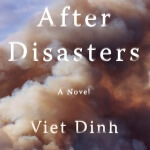08 Nov / A Dozen Diverse Debut Novels [in The Booklist Reader]
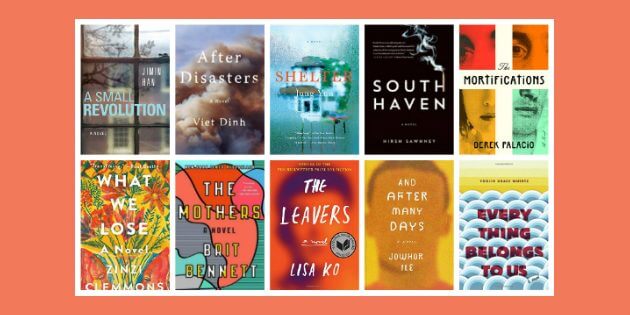
 The Sympathizer by Viet Thanh Nguyen. The Kite Runner by Khaled Hosseini. White Teeth by Zadie Smith. What do these novels have in common? All were debuts, and all earned coveted awards, plaudits, and significant sales numbers.
The Sympathizer by Viet Thanh Nguyen. The Kite Runner by Khaled Hosseini. White Teeth by Zadie Smith. What do these novels have in common? All were debuts, and all earned coveted awards, plaudits, and significant sales numbers.
For those of you watching the prize and bestseller lists, keep an eye out for these dozen diverse debut novels published in 2016 and 2017.
O. Henry Prize-winner Dinh drops four characters into the tragic aftermath of the real-life cataclysmic earthquake in Gujarat, India, in January 2001. As the protagonists travel from New York, London, and Delhi to attempt to save lives, including their own, the resulting global narrative explores the efficacy of international aid, the price of survival, and the cost of love amidst conflict, catastrophes, and failed connections. Thrown into violence and lawless chaos, one will die, two will almost fall in love, three will leave, and all will be forever changed.
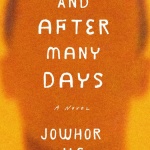 And After Many Days by Jowhor Ile
And After Many Days by Jowhor Ile
Ajie was the last person to have seen his 17-year-old brother Paul, the family’s exceptional firstborn, on a Monday afternoon during Nigeria’s 1995 rainy season. Ajie – four years younger – documents the before and after of his splintered family’s story. Ile overlays the personal onto Nigeria’s turbulent past to create a debut novel of combustive intensity and universal heartbreak.
 Everything Belongs to Us by Yoojin Grace Wuertz
Everything Belongs to Us by Yoojin Grace Wuertz
During the explosive sociopolitical upheaval of 1970s South Korea, two childhood best friends enter elite Seoul National University. Jisun is a wealthy businessman’s daughter, but eschews her privilege to live with factory workers, join demonstrations, get arrested, and aid underground organizations. In contrast, Namin has outperformed everyone to gain entry; her singular goal of becoming a medical doctor equals her family’s escape from poverty. Korean-born Wuertz bears witness to the tumult of a nation-in-the-making: clashes with U.S. occupiers, the dismantling of traditional family structures, the impending end of a dictatorship, and the possibilities of a future when everything might belong to a generation as yet unprepared for the challenges to come.
 The Last Days of Café Leila by Donia Bijan
The Last Days of Café Leila by Donia Bijan
In a quiet corner of Tehran, Café Leila is a welcoming haven for families and strangers. Seeking solace after discovering her husband’s infidelity, Noor, a San Francisco nurse, packs up her teenage daughter, Lily, and returns home to her father after 30-plus years of exile. Beyond the Café’s walls, cultural and political restrictions hold fast, but Noor finds the sanctuary she needs, even as Lily, missing her father and friends, insists she’s a virtual prisoner. Through three generations of displacement, Bijan deftly and gorgeously explores identity, belonging, families (by blood, by choice), and the ties of unconditional love.
“Everyone had stories they told themselves to get through the days,” Deming Guo muses on his 22nd birthday, summing up a lifetime of leaving – and being left – that has defined his short life. Deming, also known as Daniel Wilkinson, provides half of the dual narrative of Ko’s achingly insightful, gorgeously redemptive debut. The other half belongs to Deming’s “Mama,” also known as Peilan Guo, Polly Guo, and Polly Lin. In an uncertain world of what-if’s and what might/could/should-have-been’s, the pair searches for ways to live beyond mere survival.
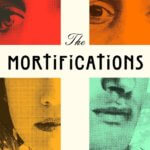 The Mortifications by Derek Palacio
The Mortifications by Derek Palacio
Soledad flees Cuba with 12-year-old twins Ulises and Isabel, abandoning her revolutionary husband Uxmal to settle in Hartford, CT. Soledad eventually takes a lover, Henri, a farmer of Dutch ancestry who attempts to cultivate Habano (Cuban) tobacco in Connecticut. Ulises, a behemoth 6’7″ teen, commits his mind to college books and his body to Henri’s tobacco fields. Isabel commits her voice to religion, taking a vow of silence. Longing and desperation reunite the estranged parents and children in a remote Cuban village, where each will confront history, culture, familial bonds, and weakened bodies, all of which are on the verge of total collapse.
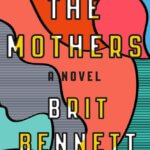 The Mothers by Brit Bennet
The Mothers by Brit Bennet
The collective elder mothers of Upper Room Chapel open with a Greek choral recitation of the happenings affecting their congregation. At the center of the chatter is Nadia, who had “earned a wild reputation” since her mother committed suicide six months earlier. The Upper Room elders know that Nadia is pregnant by the pastor’s son. Nadia chooses to attend a prestigious college, has an abortion, and flees. The repercussions of her decision will continue for years. Relationships crumble, reignite, repair, and disappear among family, friends, and lovers, but the inescapable reach of the mothers – even the missing and lost – looms.
 Shelter by Jung Yun
Shelter by Jung Yun
College professor Kyung Cho and his wife discover Kyung’s mother wandering disoriented and naked beyond their backyard. Kyung concludes she’s been battered by his father again. But when he enters his parents’ impeccable manse on the hill seeking answers, he’s shattered to find his parents and their housekeeper the victims of a heinous crime. As the extended Korean Irish American family attempts to reclaim their fractured lives, Kyung’s decades-long, suppressed rage at his abusive father and submissive mother threatens to destroy any semblance of resolution and recovery.
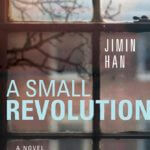 A Small Revolution by Jimin Han
A Small Revolution by Jimin Han
In a Pennsylvania college dorm, five teens are trapped in a life-or-death situation. The quintet’s point of connection is a Korean American student named Jaesung, reportedly killed in a recent car fire in Seoul. Yoona, in whose room the terror plays out, was Jaesung’s lover. Her three classmates become bargaining chips. Lloyd, armed with deadly weapons, claims both Jaesung and Yoona as intimate friends. He’s convinced Jaesung’s been victimized by a corrupt South Korean regime, and is determined to rescue him by any means necessary. Although marked by events three decades past, Revolution proves to be a resonant parable for today’s volatile, fearful times.
Siddharth Arora is just 10 when his mother dies in a car accident. Almost overnight, he goes from being a regular New Haven suburban tween to being that kid with the dead mom. His school psychologist enables him to become friends with her troubled son. His older brother leaves for university and rarely comes home. His father estranges himself from even his best friend, and eventually dares to date another woman. In this not-so-brave new world, Siddharth comes of age, searching for impossible answers, longing for connection, unsure of what the future holds.
 The Translation of Love by Lynne Kutsukake
The Translation of Love by Lynne Kutsukake
In a middle-school Tokyo classroom in 1947, two girls are assigned to share a desk: local war survivor Fumi, and Aya, a Canadian of Japanese ancestry who was sent back to a country where she’s never lived. Recognizing Aya’s English fluency motivates Fumi to make a desperate request: Fumi’s older sister is missing – last seen going to work among the occupying American GIs – and Fumi thinks Aya can help find her. Although the bullets and bombs have disappeared, postwar Tokyo – caught between enemy occupation and a desperate need to rebuild – is a lost-in-translation battleground of clashing cultures, divided morals, and tragic misconceptions.
 What We Lose by Zinzi Clemmons
What We Lose by Zinzi Clemmons
Thandi is the daughter of a New York-born mathematics professor and a Johannesburg-born nurse. She grows up privileged as a “light” African American in Philadelphia. When her mother dies of cancer, Thandi is left with a gaping emotional void that intensifies when Thandi, too, becomes a mother. Clemmons creates haunting authenticity by imbuing Thandi with autobiographical elements – parentage, life in Philadelphia, attending Columbia, her mother’s death – but through enhanced fiction, she pushes Thandi into global citizenry, explores mother-child bonds with brutal honesty, and even reveals cancer to be “a disease of privilege” elevated with ribbons and campaigns.
Published: “A Dozen Diverse Debut Novels,” The Booklist Reader, November 7, 2017

